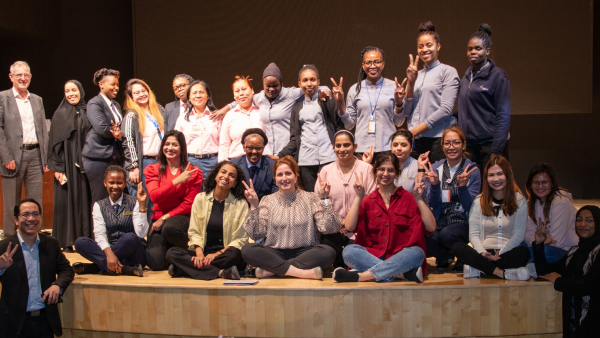QF and ILO set up first joint sub-committee dedicated to female workers in Qatar

Female workers in Qatar often feel invisible. Outnumbered and overshadowed, their unique needs and concerns are often left behind as worker welfare discussions center around the large number of migrant men.
In a bid to change this situation and ensure fair representation for both genders, Qatar Foundation (QF), the International Labour Organization (ILO), and the Ministry of Labour have come together to form the first sub-committee for our contractors’ female workers.
The initiative to form a sub-committee for women was based on audits conducted by Qatar Foundation that revealed women felt underrepresented in the existing mixed-gender joint committees.
“Working thousands of miles away from our families and homes is not easy, particularly for us women. But initiatives like this help keep our morale high. They make us feel like we are more than just a number, that we are cared for, and that our concerns matter,” said Chresthel Joy, from the Philippines, who works as a hospitality worker.
Joint Committees first came into existence in Qatar in 2019, with QF contractors being part of the pilot program with ILO. They aim to bring together management and elected workers’ representatives to identify and resolve workplace issues through joint resolution, avoiding contractor abuse and direct action.
Joint Committees meet at least once a month, providing a platform for regular dialogue between elected employees and management. Workers can channel their concerns to their employer directly and work together to resolve issues quickly and transparently with the support and guidance of QF, the ILO, and the Qatar Ministry of Labour.
To set up the sub-committee, over 200 contracted female workers across QF were invited to an awareness session to introduce them to the concept of joint committees. Some of these women were then nominated and voted by their peers to become their representatives.
19 elected representatives then received further training on their roles and responsibilities in another session.
Since male and female workers are housed in separate accommodations, women have far fewer opportunities than men to interact and inform their representatives of any issues they face. Women often feel their concerns were not adequately represented by their male representatives.
Noura H. Al Ibrahim, Workers Welfare Project Manager at QF said: “This initiative gives female workers a safe and secure platform to make their voices heard and solve important workplace and accommodation issues. There are many topics that women may hesitate to voice in a mixed gender environment, and this committee will help ensure they can benefit from the same opportunities and rights as their male counterparts. The most important thing is we made a start! I am confident we will see notable improvements through these open discussions”
Helen Kingori from Kenya, a cafeteria supervisor at one of QF’s Qatar Academy schools, was previously a member of the mixed-gender joint committee. Now elected to be a representative of the women’s sub-committee, she said: “This is different. It feels like a safe space. Being in a room with just other women, I feel like I can talk more openly and that I don’t have to think twice before talking about issues specific to women. It makes me and my colleagues feel empowered.”
Ajenifuja Anthea from South Africa, who has now been in Qatar for eight years, was elected as the Chairperson for the women’s subcommittee. As Chairperson, her role will be to come up with an action plan for resolving priority issues.
Shortly after the sub-committee’s first meeting, Anthea noticed some training gaps. “Most of the women don’t know how to calculate their overtime or gratuity. Bridging this training gap is a priority for me. By educating them on their rights, we can empower them. In my opinion, training is particularly important when it comes to remuneration, as money is the reason we are all here.”
Namatoru Prossy from Uganda, a cleaner, sees being elected as a representative as a big responsibility that her peers have entrusted her with. Her biggest priority is to work on making upskilling opportunities available to workers. She explained that many workers find themselves doing the same tasks for long periods due to the nature of their jobs, leading to low morale
She proposed a solution. “If employers could offer a rotation of workplaces, meaning after six months or a year of working in a school, and then we could be moved to an office building. This is a simple way for us to experience working in different environments, each one of which comes with different challenges and learning experiences and would help us stay motivated.”
Among the concerns discussed during the first meeting included women’s health and safety issues, harassment and discrimination, curfew imposed on women by some employers, transportation challenges, and more. Some of these can be resolved quickly, others will need further discussion and negotiation to reach a solution.
“By establishing this women’s sub-committee, QF is making an important commitment to building an inclusive environment for women employees from its partner community. We are hopeful that, through social dialogue, the committee will introduce positive changes to the lives of women workers and inspire other institutions to create these spaces for women workers,” said Marie-Jose Tayah, Technical Specialist for Social Dialogue at the ILO Office in Doha.
Background Information
Qatar Foundation
Qatar Foundation (QF) is a non-profit organization made up of more than 50 entities working in education, research, and community development.
Our unique ecosystem—supported by partnerships with leading international institutions—is built on initiatives that address our most pressing challenges, create global opportunities, and empower people to shape our present and future.







